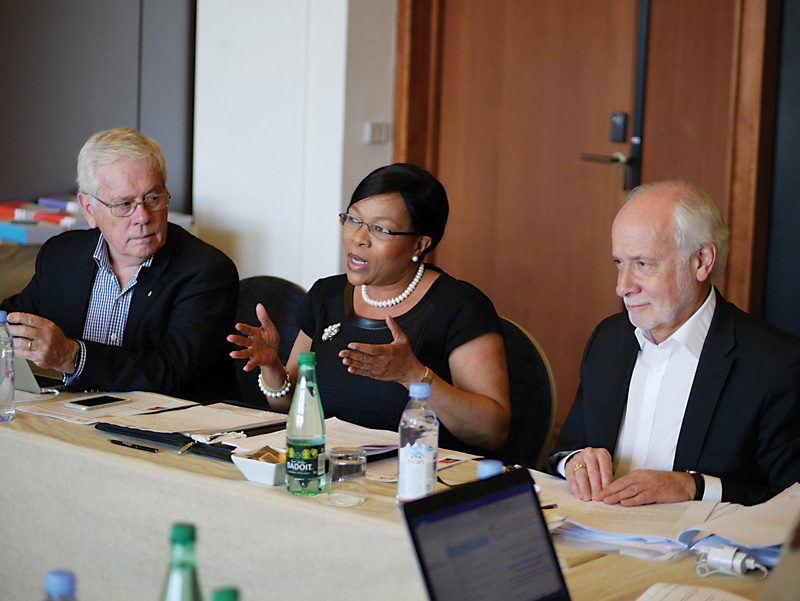
Feature
Leading the Future of Curriculum
A Review of 2016/2017
March 19, 2018
Only two years after the adoption of the 17 Sustainable Development Goals (SDGs), with education captured in SDG4 and recognized as an enabler of the other 16 goals, the route towards an impactful implementation of SDG4 is taking shape, branded by the Education 2030 Agenda.
illustration by multiple
For the global education community, there is still time to reflect on how to best walk the Education 2030 talk. Scars from some of the deepest wounds of the EFA agenda are still tender, and many people around the world are determined not to relive the past. The IBE is central to these reflections, not only because it is part of the global education community but also because anything in life, if it is important enough, will wind up in the curriculum; and the IBE is a global Center of Excellence in curriculum and related matters.
By Mmantsetsa Marope
19/03/ 2018
·
- Share

Photograph: Alamy
Examples abound. The transition from natural resource dependence to knowledge and technology dependent development is introducing skills for knowledge-based economies into curricula. Changes in the work place, ways of working, and tools of working are bringing into curricula new skills for employability, work and life. The information and technology revolution is bringing digital content and digital skills into curricula, including the digitization of curricula themselves. The scourge of HIV/AIDS brought the issue squarely into curricula. Globalization, climate change and concern for sustainability impelled curricula to include sustainable development and global citizenship education. The spike in violent extremism over the past half-decade forced a return to the fundamentals of Delors’ “learning to live together”. In response, curricula had to include global citizenship education. The IBE launched an initiative on Preventing Violent Extremism through Universal Values in Curricula. The onset of Industry 4.0forces all of us to question the readiness of education systems to prepare learners for this phenomenal change, and to ask what should go into curricula.
As would any significant wave of change, the Education 2030 Agenda beckons curricula to respond, and more importantly, to take initiative.
Walking the Education 2030 talk
Fortuitously, key markers of the Education 2030 Agenda – equity of quality, effective learning and improved learning outcomes, and relevance to sustainable development – align well with the core mandate of the IBE. This strategically positions the IBE to ‘walk the education 2030 talk’.

Barry McGaw (University of Melbourne), and Anthony Mackay (Center for Strategic Education, Melbourne) joined Mmantsetsa Marope, IBE Director, in steering a high-level dialogue on future competences and the future of curricula. IBE Global Forum, Evian, March 2017.
Engendering education quality through the curriculum
Curriculum contributes to the quality of education in a fundamental way. It determines what will be learned, when, how, and by whom. It also guides key education processes that decisively determine the quality of education, learning, and ultimately, learning outcomes: Teaching, learning, and assessment.
During 2016/2017, the IBE continued to deepen the quality of curricula through its accredited training programs, technical assistance, and skills transfer. The number of countries that have benefitted from the IBE training courses reached a new peak at 78. Training programs are grooming leaders who will chart the future of curriculum in their respective countries. In 2016/2017 alone, graduates assumed positions of leadership in curriculum across 13 countries. A total of 23 countries received technical support from the IBE to improve the quality of their education systems through curricular reforms of diverse scope. Four countries revised their national curriculum frameworks, 7 started to reorient their curricula towards a competence-based approach, 3 began to integrate STEM education into their policies and curricula, 3 integrated global citizenship education into their curricula, 5 began to fully articulate ECCE into their curricular frameworks, and 5 joined peer learning sessions in preparation for revising their ECCE curricula. In early 2017, 18 countries converged in Seychelles to share best practices in ECCE and to chart future south-south, north-south collaborations.
Brokering cutting-edge research for deeper learning
Ineffective facilitation of learning can undermine the best curriculum. Learning is the final phase of the curriculum process; without it the best curriculum is just an impotent document that cannot improve learning outcomes. Yet, to judge from the feeble record of the EFA agenda, effective facilitation of learning still eludes the education community. Many education systems fail to register the level of learning outcomes to which they commit, and this is a threat to the attainment of the SDG4 targets. It is equally a threat to the other 16 SDGs, which depend on quality education for their attainment.
The IBE holds that a deeper understanding of how humans learn is desperately needed to better facilitate learning. In response, in 2016/2017 it began translating neuroscience research to better inform teaching, learning, and assessment practices. In collaboration with leading centers of learning sciences, the IBE set up a clearinghouse for the sciences of learning. These partnerships are growing. From the IBE alone, a minimum of 30 briefs covering key themes on the learning brain will be deposited annually in the clearinghouse. This translated knowledge is also integrated into the IBE’s training courses for teachers and curriculum specialists, placing them at the frontiers of knowledge and practice.
Building resilient ECCE systems
Compelling research evidence attests that ECCE is an indispensable foundation for effective and lifelong learning. The IBE is supporting equity of education quality and learning at this base, because effective learning is a cornerstone of effective curriculum implementation. The IBE ramped up its support to Member States to build resilient and effective ECCE systems. As already mentioned, 5 countries received support to fully articulate ECCE into their curricula frameworks, and 5 joined peer learning sessions in preparation for revising their ECCE curricula. A high point in this work was the ascension of the Republic of Seychelles into an IBE-UNESCO Best Practice Hub in ECCE; it is already providing technical assistance to other countries.
Strengthening the assessment of learning
Assessment processes collect evidence on whether learning is actually taking place and whether it is guided by the official/intended curriculum. Rightly or wrongly, learning outcomes are used as the ultimate evidence of education quality. They are used to judge and even rank the performance of countries, ministers, ministries, schools, teachers, and learners. Not surprisingly, what is assessed becomes ‘the curriculum’ by default. Assessments that are not aligned well with official curricula can derail what was intended. Ensuring the alignment and integration of curriculum, teaching, learning, and assessment is fundamental to improving education quality.
The IBE intensified its support to Member States’ assessment frameworks, taking an integrated approach to curriculum, teaching, learning, and assessment. Even more importantly, it prepared a normative paper outlining the transformation required to ensure that assessments are appropriate for competence-based curricula.
Improving assessment requires a deep appreciation of current national assessment frameworks, providing context to establish the future of curriculum, teaching, and learning. Through its e-platform, In Progress Reflections, the IBE is sustaining intellectual dialogue on assessment. It has also analyzed assessment frameworks across 70 countries to gain insights into what needs improvement. This work will continue into the intermediate future, not only to inform assessment, but also to support the monitoring of SDG4 targets on learning.
Strengthening the effectiveness of education systems
Effective education systems serve as enabling environments for effective curriculum implementation. The converse is also true. An excellent curriculum that is plunged into a dysfunctional education system will not provide the expected impact. Poor curriculum implementation spells poor education quality and poor learning outcomes.
During 2016/2017, the IBE strengthened its direct support to the capacity of education and learning systems. Nine countries developed interventions that address binding constraints to their equitable and resource-efficient delivery of quality and development-relevant education and learning.

illustration by multiple
Ensuring equity and inclusion through and in education
The IBE’s intellectual and technical leadership in equity and inclusion is unmistakable. This continues to be a key theme for the In Progress Reflections, books, and resource packs. During 2016/2017, the IBE co-produced UNESCO-wide policy guidelines on inclusive education. It published a book titled From Exclusion to Excellence: Building Restorative Relationships to Create Inclusive Schools. It also published, in English and Japanese, Reaching out to All Learners: A Resource Pack for Supporting Inclusive Education; a Resource Pack on Gender Sensitive STEM Education; one issue of the Education Practice series titled Teaching and Learning: Improving the Quality of Education for Economically Disadvantaged Students; and one working paper on The Role of Curriculum in Fostering National Cohesion and Integration: Opportunities and Challenges in Kenya. These resources continue to guide technical support towards inclusive curricula. Eleven countries received technical support to make their curricula more inclusive. This is in addition to the countries that may be using IBE resources on their own. The resources were also used to continuously upgrade training programs.
Sustaining development relevance
During 2016/2017, the IBE reaffirmed its intellectual and normative leadership in its areas of competence. It produced a normative paper, Rethinking and Repositioning Curriculum in the 21st Century: A Global Paradigm Shift (Marope, 2017). Among other points, the paper calls for a global recognition of curriculum “as the first operational tool for giving effect to policies on the relevance of education to development”. The centrality of education in enabling development across all spheres is universally acknowledged. But it is through curricula that societies define the competences that people must develop in order to effectively contribute to holistic, inclusive, equitable, just, and sustainable development. To say that an education system is not relevant to development is equivalent to saying that its curricula fail to enable learners to acquire required competences.
As part of its call for a paradigm shift, the IBE also articulated other support papers to complete a compendium of normative guidance on the integration of curriculum, teaching, learning, and assessment within a competence-based approach: Competences for the Fourth Industrial Revolution: A Global Reference Point for Curricula Transformation (Marope, Griffin, and Gallagher, 2017); Transforming Teaching, Learning and Assessment for Competence-Based Curricula (Griffin and Gallagher, 2017); and Creating Enabling Systemic Environments for Effective Implementation of Competence-based Curricula (Marope and Gallagher, 2017).
Sustaining the development relevance of curricula in the context of fast and constant change is a challenge. Moreover, Industry 4.0 is an unstoppable accelerant not just to the pace of 21st- century change, but also to its complexity and velocity. I 4.0 is described as a technological revolution whose velocity, scale, scope, complexity, and transformative power is unlike anything humankind has experienced before (Schwab, 2015).
On the other hand, if not well managed, efforts to keep curricula perennially relevant and contextually responsive carry their own risks. Curricular reforms can induce disruptive instability when they do not allow changes to take root and have an impact before the next reforms arrive. Reforms can – and often do – lead to curricular overload as instrumentalist elements begin to crowd out the core function of education: learning. First and foremost, this core function is to create effective lifelong learners agile enough to adapt to contextual changes and to change their contexts as the need arises. The quest for responsiveness can make curricula that are susceptible to special interests and even bipartisan politics, or that create merely a façade of transformation.
All these risks acknowledge the reality of our time: that the already short innovation cycles of the 21st century are getting shorter. Curricula are challenged not only to respond, but also to actually lead change and innovation. This seriously challenges not only the content of curricula but also the management of reforms and/or transformation processes.
The normative guidance from the IBE balances the quest for relevance with the need for stability. Furthermore, the IBE has begun to establish a global observatory with the capacity to look ahead and anticipate curriculum at the supra level of the world. The work of the observatory will inform curricular reforms at the macro level of countries; the meso level of states, provinces, and districts; the micro level of schools, and the nano level of teachers and students. The guidance will also include tips on how to sustain contextual responsiveness while safeguarding core functions. Overall, the design, development, and implementation of curriculum that we witnessed in the 20th century will simply not cut it in the era of I 4.0 and beyond. Being ready for the future is imperative.

Smiling school kids in Kuala Lumpur, Malaysia. Photograph: Alamy
A focus on sustainable peace
Sustainable development is impossible without sustainable peace. As the IBE supports the development- relevance of curricula, it is attentive to its role in supporting sustainable peace. This role is anchored in the constitution of UNESCO, which recognizes that “since wars begin in the minds of men, it is in the minds of men that the defenses of peace must be constructed”. Defending peace means touching minds.
Through its promotion of equity and inclusion, the IBE promotes global peace. More directly, in 2016, the IBE launched an initiative on the Prevention of Violent Extremism through Universal Values in Curricula. In partnership with the Republic of Azerbaijan, the IBE is also promoting multiculturalism as a way to a prosperous, fulfilled, peaceful, just, and reconciled future (see article in this issue). In collaboration with the Asia Pacific Center of Education for International Understanding (APCEIU), the IBE is also supporting countries as they fully integrate global citizenship education into their respective curricula. A close watch is on Uganda, Colombia, Cambodia, and Mongolia to emerge as IBE-UNESCO Best Practice Hubs in global citizenship education.
The IBE also worked with neuroscientists and other scholars to determine the origins of social prejudice and identify ways to combat it. In this issue of In Focus, Allison Skinner and Andrew Meltzoff inform us that social prejudice creeps into the minds of our children as early as preschool age. The take-home message is that it can NEVER be too early to push back on the precursors of violent extremism. Aluta continua!
Conrad Hughes takes us through the prevention of prejudice at the secondary school level. Then, we see a glimmer of hope, from Ambassador Vaqif Sadiqov of the Republic of Azerbaijan. He tells of his country’s history and how it is actually possible to live together harmoniously in peace and justice. Then a final word of wisdom from His Excellency the President of the Republic of Azerbaijan: Multiculturalism is not a challenge. It is actually an asset!
Reasserting our global convening power
Since its inception in 1925, the IBE has enjoyed immense global convening power. This was consolidated in 1929, when it became the first intergovernmental organization in education. The heritage lives on! In its role as the global norm and standard-setting institution for curriculum and related matters, global credibility and legitimacy are core currency.
The normative instruments mentioned above are not products of the IBE alone. They were produced with invaluable inputs from global thought leaders on the future of curriculum who were convened twice by the IBE during 2017.
They also benefitted from the generous inputs of leaders of national curriculum centers who constitute the IBE’s Global Curriculum Network (GCN), whose membership reached 150 countries in 2017.
The IBE also convened or co-convened several key forums to share best practices and to promote collaboration around its flagship programs. In October 2016, in New Delhi, it convened 15 countries on Adopting a Technology Perspective to Education and Learning. Early in 2017, with the Seychelles Institute for Early Childhood Development, it co-convened 18 countries to share best practices under the theme Building Resilient ECCE Systems: What will it take? It also convened 3 Sahel countries to share experiences from a joint project on Reading and Writing in the Early Grades.
References
Griffin, P., & Gallagher, C. (2017). Transforming teaching, learning and assessment for competence-based curricula. Geneva: UNESCO IBE.
Marope, M. (2017). Rethinking and repositioning curriculum in the 21st century: A global paradigm shift. Geneva: UNESCO IBE.
Marope, M., & Gallagher, C. (2017). Creating enabling systemic environments for effective implementation of competence-based curricula. Geneva: UNESCO IBE.
Marope, M., Griffin, P, & Gallagher, C. (2017). A global reference point for curricula transformation. Geneva: UNESCO IBE.
